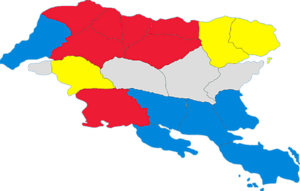Gylian federal election, 2012
| |||||||||||||||||||||||||||||||||||||||||||||||||
All 500 seats in the Chamber of Deputies 251 Chamber of Deputies seats seats needed for a majority | |||||||||||||||||||||||||||||||||||||||||||||||||
|---|---|---|---|---|---|---|---|---|---|---|---|---|---|---|---|---|---|---|---|---|---|---|---|---|---|---|---|---|---|---|---|---|---|---|---|---|---|---|---|---|---|---|---|---|---|---|---|---|---|
| Turnout | 95,5% | ||||||||||||||||||||||||||||||||||||||||||||||||
| |||||||||||||||||||||||||||||||||||||||||||||||||
 | |||||||||||||||||||||||||||||||||||||||||||||||||
| |||||||||||||||||||||||||||||||||||||||||||||||||
Federal elections were held in Gylias on 22 January 2012, to elect the 500 members of the Chamber of Deputies.
Toni Vallas led the Progressive Alliance to its first plurality victory since 1969, putting an end to two decades of Liberal Union-led governments. She formed a coalition government with the Liberal Union, Green Party, and Independent Regional Alliance for Minorities.
Electoral system
The Chamber of Deputies was elected through single transferable vote, using the Droop quota and 5-member circonscriptions, drawn by Elections Gylias based on regional populations.
Parties were not allowed to nominate more than one candidate per seat. Candidates were not allowed to serve in the Senate simultaneously.
Parties
Background
Kaori Kawashima announced on 11 November 2011 that she wouldn't seek a new term in office and would resign as the Liberal Union's foresitter. Her popularity as Prime Minister hadn't managed to invigorate the LU, which increasingly faced criticism that it lacked ideas and had been leading the government too long.
Virtually all electoral blocs went into the election with new leaders: the Progressive Alliance was now led by Toni Vallas, while the National Bloc saw Stéphanie Daniau replace long-serving opposition leader Eiko Fujimura.
With GDP growth averaging 3,2% under Kaori and few immediately pressing international matters after the Zemplen War's end, the public expected another largely tranquil election.
Campaign
Much attention during the campaign was focused on the contest between frontrunners Toni Vallas and Stéphanie Daniau — both among their blocs' youngest leaders, and vying to plot a new course for Gylias after 2 decades of liberal dominance.
Toni focused her campaign on eco-socialism and worked to court support from leftist Non-inscrits, particularly the Green Party. Stéphanie sought to build on the National Bloc revival overseen by her predecessor Eiko Fujimura and reach out to younger voters.
Results
In accordance with electoral law, the results were embargoed until the full counting and transfers were completed, and were released all at once on 25 January.
| Parties and blocs | Chamber of Deputies | |||||
|---|---|---|---|---|---|---|
| FPV | % | ± | Seats | ± | ||
| Progressive Alliance | 3.930.508 | 24,6% | 90 | |||
| Non-inscrits and independents | 3.339.334 | 20,9% | 183 | |||
| Liberal Union | 3.243.468 | 20,3% | 75 | |||
| National Bloc | 3.163.579 | 19,8% | 86 | |||
| Centre Group | 2.109.053 | 13,2% | 64 | |||
| Union for Freedom and Prosperity | 111.844 | 0,7% | 2 | |||
| Revolutionary Rally | 63.911 | 0,4% | 0 | |||
| Front for Renewal of Order and Society | 15.978 | 0,1% | 0 | |||
| Total | 15.977.673 | 100% | — | 500 | — | |
| Registered voters and turnout | 16.880.787 | 95,5% | ||||
Analysis
The big winner on the night was the PA, which saw a nearly 4% increase in its first preference vote and a gain of 20 seats, producing its first plurality since 1969. The NB had a similarly strong performance, turning a fourth place finish and minor decline in first preference votes into a gain of 18 seats, bringing them only 4 seats short of the PA.
The Non-inscrits remained solidly in second place, overcoming a loss of 33 seats.
Notable on the map was the larger number of pluralities by established blocs, mainly at the expense of the non-inscrits. The PA won over enough left wing support to gain pluralities in Mişeyáke and Tomes, while coming second in Nezyál. The NB gained a plurality in Herlan, against close competition from the PA and non-inscrits, and in Tandar.
Aftermath
The new Parliament was sworn in on 1 February 2012. The Toni Vallas government was formed, a coalition of the Progressive Alliance, Liberal Union, Green Party, and Independent Regional Alliance for Minorities. This was Gylias' first federal traffic light coalition.


